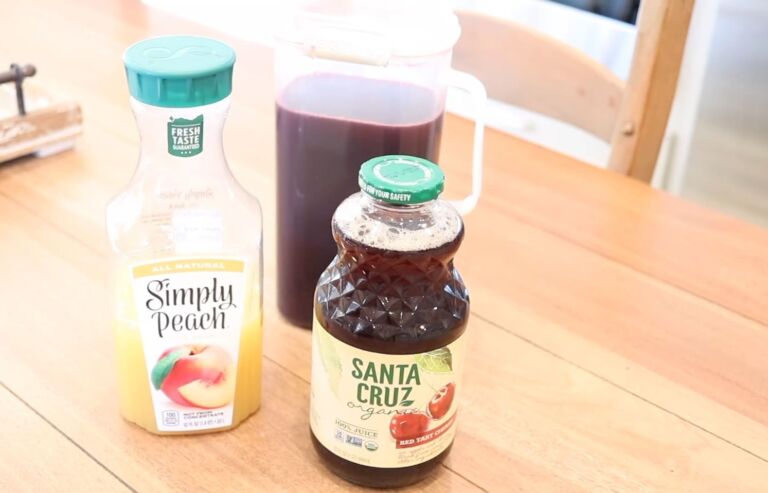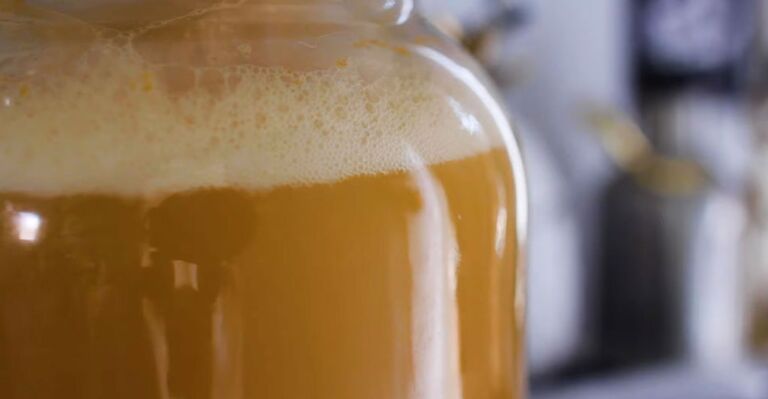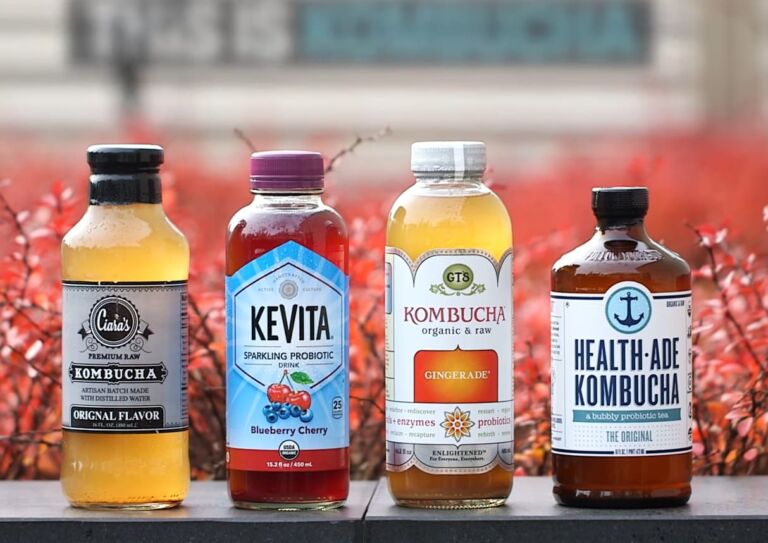Can Kids Drink Kombucha?
Kombucha, the tangy fermented tea drink, has become popular recently. With its reputation as a health tonic, many parents have wondered if Kombucha is safe for children to consume. This fizzy probiotic drink contains trace amounts of alcohol due to fermentation, raising concerns. While Kombucha offers a range of potential benefits, from antioxidant properties to probiotics for improved digestion, parents need to weigh these against potential risks for children. This article will explore the debate around Kombucha and kids – looking at the pros, cons, and expert opinions on the appropriate age to introduce this funky fermented favorite.
Quick Glance Highlights
Kombucha does contain a small amount of alcohol from the fermentation process, so many health experts advise against giving it to young children. Generally, Kombucha is considered safe for kids over age 13. The American Academy of Pediatrics recommends against alcohol consumption for children under age 21. For kids under 13, Kombucha is not recommended due to potential effects on growth and development. However, teens can likely handle small amounts of Kombucha safely. Still, moderation is essential, and parents should supervise kombucha intake. When consumed responsibly, Kombucha can be a healthy drink for older kids and adults.

Alcohol Content
Kombucha is a fermented tea that has recently become a probiotic drink. However, some concerns have been raised over its potential alcohol content.
Introduction to Kombucha Fermentation
Kombucha begins as brewed tea with added sugar, fermented using a symbiotic culture of bacteria and yeast known as a SCOBY. The yeast breaks down the sugar into alcohol and carbon dioxide, while the bacteria produce organic acids like glucuronic acid, giving Kombucha its characteristic sour flavor. The fermentation process results in trace alcohol production as the yeast converts the tea’s sugars into alcohol.
Typical Alcohol Content of Kombucha
The alcohol content of most Kombucha is usually less than 0.5% ABV (alcohol by volume). This trace alcohol is comparable to what you would find in fruit juices. Under 0.5% ABV, FDA standards consider Kombucha a non-alcoholic beverage. The small amount of alcohol contributes to the tangy flavor profile but is insufficient to cause intoxication.
Factors that Increase Alcohol Content
However, some factors can increase the alcohol percentage:
- Longer fermentation time – Allowing Kombucha to ferment for 3-4 weeks or more can increase the alcohol content as the yeast continues to produce alcohol.
- High temperatures – Warmer fermentation temperatures above 80°F will accelerate yeast activity and alcohol production.
- High sugar concentration – More sugar for the yeast to metabolize can lead to higher alcohol levels.
- Additional yeasts or flavorings – Extra yeast strains or high-sugar fruit purees introduced after brewing can further increase alcohol through continued fermentation.
Always Check the Label
While most brands stay under 0.5% alcohol, some specialty kombuchas may have an alcohol content of 1-3% ABV or more. Given concerns over alcohol consumption, it is essential to check the label for an accurate alcohol percentage, especially when selecting Kombucha for children. Brands that produce higher-alcohol kombuchas may be inappropriate for people avoiding alcohol.
Maintaining Safe Alcohol Levels
Reputable kombucha makers test and control alcohol content during production to ensure each batch remains non-alcoholic. Proper fermenting conditions, limiting fermentation time, and testing alcohol levels using chromatography are a few ways kombucha producers keep alcohol in the safe zone. While Kombucha always contains trace alcohol from fermentation, controlling the process allows this functional drink to remain accessible for all ages.

Caffeine Content
Kombucha is made from brewed tea, so it naturally contains some caffeine. However, the level of caffeine in Kombucha is relatively low compared to tea or coffee.
Introduction to Caffeine in Kombucha
Kombucha begins with brewed black or green tea, providing the base liquid fermented with yeast and bacteria. Since all tea contains caffeine, some caffeine is present in Kombucha. However, the caffeine content in Kombucha is substantially reduced during fermentation.
Typical Caffeine Levels in Kombucha
According to testing, Kombucha generally contains about 1-2 milligrams of caffeine per ounce of Kombucha. This equals around 10-15mg per 8 oz serving. In comparison, brewed black tea contains about 30mg of caffeine per 8 oz serving, while coffee has about 95mg per 8 oz serving.
So Kombucha has only about one-third the caffeine of brewed tea and as little as one-tenth the caffeine level of coffee. The fermentation causes much of the original caffeine from the tea to degrade and convert into other organic compounds.
Factors that Increase Caffeine Content
While Kombucha is naturally low in caffeine, some factors can slightly increase the amount:
- Starting tea type – Green tea contains more caffeine than black tea per serving, so that green tea kombucha will have more caffeine.
- Brewing time – Steeping the tea longer before fermentation pulls more caffeine into the liquid.
- Fermentation time – Shorter fermentations retain more caffeine from the tea.
- Tea bags vs. loose-leaf tea – More tea leaves in loose-leaf brewing results in higher caffeine levels.
Even with these factors, Kombucha remains low in caffeine, but it’s helpful to know what production methods can raise the amount for those limiting caffeine intake.
Decaffeinated Kombucha
Some kombucha brands offer decaffeinated versions made from decaffeinated tea. These contain only trace amounts of caffeine, around 1-2mg per serving. This allows people who are pregnant, caffeine-sensitive, or avoiding caffeine to enjoy Kombucha. Checking labels for “decaf” is critical for determining whether caffeine has been substantially removed.
So, while traditional Kombucha does contain modest amounts of caffeine from the tea used, levels are low compared to other caffeinated beverages. Drinking Kombucha should not cause significant jittery effects or keep most people up at night. The fermentation process drastically cuts the caffeine content from the tea. Those who are especially caffeine-sensitive can opt for decaf kombucha to get all the benefits without the buzz.

Safety for Children
With the rising popularity of Kombucha, many parents have wondered whether this fermented tea drink is safe for their children to consume. There are some considerations regarding Kombucha and kids.
Introduction to Kombucha and Children
Kombucha is a probiotic beverage made by fermenting tea with bacteria and yeast. This process creates trace amounts of alcohol and reduces the original caffeine from the tea leaves. The impact of these components on developing children has yet to be fully known, which has raised questions about appropriate consumption ages.
Caffeine Concerns
Kombucha is brewed from black or green tea, both containing caffeine. The American Academy of Pediatrics recommends no caffeine intake for children under 12. While Kombucha contains far less caffeine than a cup of tea, some caffeine is present. For pre-teens, even low caffeine levels may cause adverse effects.
Alcohol Content Considerations
Additionally, the alcohol produced during fermentation may be inappropriate for young children. The American Academy of Pediatrics advises no alcohol consumption for minors under 21. Although kombucha alcohol percentages are negligible compared to beer or wine, parents may still wish to avoid alcohol exposure for their kids.
Suggested Age Minimums
Due to the above concerns, most health experts caution against regular kombucha consumption for children under 13. Occasional small servings can be considered for mature teenagers, but daily use is not advised. Carefully checking labels and limiting intake are recommended when introducing Kombucha to adolescents 13-18. For children under 10, avoiding Kombucha or restricting to tiny samples on particular occasions may be wise until more research exists.
Considering Your Child’s Needs
As a parent, you can make an informed decision based on your child’s age, sensitivity to caffeine, and exposure to fermented foods. While no strict age limit exists for trying Kombucha, adhere to recommendations and limit frequency for young teenagers. Consult your pediatrician if concerned. A cautious approach is reasonable until more evidence supports Kombucha’s safety profile for kids.
With supervision and moderation, Kombucha may be incorporated into older children’s diets. However, daily consumption is not encouraged, given the need for more research on its long-term effects on developing youth. As with any food, balance and age-appropriateness are vital considerations.

FAQ
What is Kombucha, and does it contain alcohol?
Kombucha is a fermented tea drink that contains trace amounts of alcohol due to fermentation, typically less than 0.5% alcohol by volume. Kombucha starts by brewing tea and adding sugar, then fermenting it using a SCOBY, or symbiotic culture of bacteria and yeast. The yeast breaks down the sugar into alcohol and carbon dioxide, while the bacteria produce organic acids like gluconic acid, giving Kombucha its characteristic sour taste. The alcohol content is comparable to that found in fruit juices.
At what age is it safe for kids to start drinking Kombucha?
Most health experts advise against giving Kombucha to children under 13 due to the alcohol content and potential risks. Children’s brains and bodies are still developing, so Kombucha’s acids and alcohol may interfere with growth. The American Academy of Pediatrics recommends no alcohol consumption for children under age 21. For adolescents age 13 and up, small 4-8 oz servings a few times per week are fine. However, moderation is critical until research establishes Kombucha’s safety for young consumers. Parents should supervise teen kombucha intake.
What are the potential benefits of Kombucha for kids?
Some of the touted benefits of Kombucha for adults could also apply to older children in small doses. The probiotics may aid digestion and gut health. The antioxidants found in tea may support the immune system. Kombucha can provide hydration and nutrition from B vitamins produced by the SCOBY culture. The glucuronic acid in Kombucha may help detoxify the body. However, any benefits must be weighed against the risks of consuming alcohol and acids at a young age when the long-term effects are unknown. Most experts agree an occasional small serving is likely safe for healthy teenagers, but daily use is not recommended.
What are the risks associated with kids drinking Kombucha regularly?
Regular kombucha consumption may pose short- and long-term health risks for children under 13. Acids and alcohol could impact the gut lining, affect liver function, and interact with medications or other beverages if a child is not metabolizing them efficiently. The organic acids may move bone density over time. Trace contaminants from fermentation could also be a concern with overconsumption. Chronic use could allow alcohol dependence to develop.
Additionally, the sugar content should be limited for kids’ diets. More research is needed, but until safety is established, daily Kombucha is not advised for children. Moderation is key.
At what age can kids start drinking Kombucha safely?
There is no established age for the safe introduction of Kombucha. Given the current recommendations against alcohol consumption under the age of 21, allowing teenagers aged 16-18 to drink Kombucha in moderation with parental permission is likely okay. Again, daily intake should be advised. For younger teens aged 13-15, parental rules on occasional, tiny servings are reasonable, provided kids are healthy and mature enough to consume responsibly. Parents can gauge reactions and set appropriate limits. For kids under age 10, most experts would recommend avoiding Kombucha or restricting it to a once-in-a-while celebratory “treat” of a few sips until further research supports its safety for children.
Related Video: Can kids drink Kombucha?
Summing Up
While Kombucha offers some potential health benefits, current recommendations advise against regular kombucha consumption for children under 13. The trace amounts of alcohol and acids found in Kombucha may pose health risks and affect development when ingested by young kids. For teenagers, Kombucha is likely safe in moderation. However, parents should still supervise intake. While Kombucha is a trendy, functional drink among adults, the jury is still out on what age it becomes appropriate for children. Until more definitive research emerges, parents are best following expert guidelines and using caution with Kombucha for kids. Moderation and supervision are key for teens exploring this tangy health tonic.







